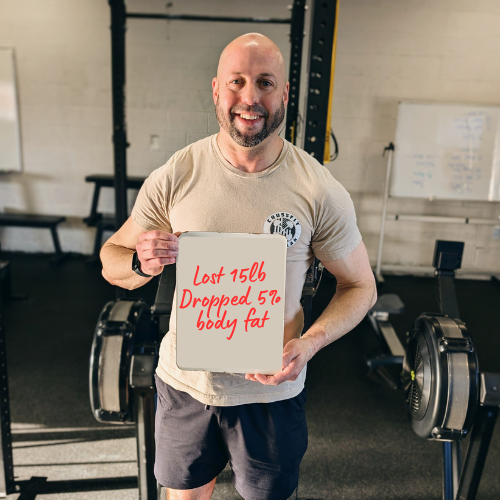How To Boost Your Metabolism After 35
I know, we don't like to think about getting older and what's actually happening to our bodies. But the reality is, it takes me longer to recover, I have to be more careful with what I eat if I want to feel good, AND I need to be more intentional about how I work out to avoid straining my body too far.
A conversation I have with many clients is understanding how many calories they need to maintain an effective deficit to lose weight while gaining muscle. We start with BMR (Basal Metabolic Rate) and then add an activity factor. But before we go there lets start with
As we get older, maintaining the body we want can feel like an uphill battle. After age 35, it’s common for the body’s natural metabolism to slow down, which can make it easier to gain weight and harder to lose it. Many people gain weight through these years not because they eat more than before or move less but because they don't realize that their body isn't burning as many calories as it used to and they don't adjust their nutrition or activity habits.
Here’s the good news: you can boost your metabolism with a few key habits and lifestyle adjustments.
If you’re in your 30s or beyond and want to stay fit, strong, and energized, here’s what you need to know about giving your metabolism the jumpstart it needs.
1. Build Muscle Mass Through Strength Training
One of the most effective ways to boost metabolism at any age is strength training. After 35, the body tends to lose muscle mass at a gradual rate, which can slow down your metabolism since muscle tissue burns more calories than fat, even at rest. By incorporating strength training into your weekly routine, you can rebuild and maintain muscle, which helps your body burn more calories all day long.
You can start with light weight or bodyweight but learning how to lift weights with good form is necessary to build muscle, get stronger, and build solid bones.
2. Prioritize Protein in Your Diet
Protein isn’t just for athletes; it’s essential for everyone, especially as we get older. Protein helps repair and build muscle tissue and has a higher “thermic effect” than other macronutrients, which means your body uses more energy to digest protein than it does for carbs or fats. Including lean proteins like chicken, fish, eggs, beans, and low-fat dairy with each meal helps keep your metabolism active and supports your strength-training efforts.
A good rule of thumb is to aim for 20-30 grams of protein per meal if you eat 4-5x/day. This will help you feel full longer, maintain muscle, and keep your metabolism working efficiently.
3. Stay Active with Daily Movement
While dedicated workouts are great, one of the best ways to boost your metabolism is by moving consistently throughout the day. This doesn’t mean you need to run a marathon; simple, everyday activities can make a big difference. Walking, stretching, and taking the stairs instead of the elevator all help keep your metabolism humming.
Consider tracking your daily steps or setting reminders to move every hour. Adding just a little extra movement to your day—like a quick 10-minute walk after lunch or light stretching in the evening—can go a long way in keeping your metabolism elevated and your energy levels up.
4. Don’t Skimp on Sleep
It might seem unrelated, but sleep is a major factor in how well your metabolism functions. When you’re sleep-deprived, your body’s hormones can get out of balance, making it harder to burn fat and more likely to store it. Poor sleep can also increase your appetite and lead to cravings for sugary and high-carb foods, which slow down your metabolism.
Most adults need around 7-9 hours of sleep each night. Quality rest allows your body to recover, repair, and maintain optimal energy levels, so make sleep a priority to keep your metabolism running smoothly.
5. Stay Hydrated
Water plays a key role in metabolic health, as it’s involved in nearly every cellular process in the body. Staying hydrated helps your body function at its best, including calorie-burning processes. Even mild dehydration can slow down your metabolism, so make it a goal to drink water consistently throughout the day.
If you’re not sure how much to drink, aim for about 8 glasses of water a day, or more if you’re active. To make it easier, carry a reusable water bottle with you and take sips regularly to keep your energy and metabolism up.
6. Keep Stress Levels in Check
Chronic stress can slow your metabolism by causing spikes in the hormone cortisol. When cortisol levels stay high, the body tends to store fat, particularly in the belly area, making it more challenging to lose weight. Finding ways to manage stress—like meditation, walking, or a relaxing hobby—can help reduce cortisol and support a healthy metabolism.
A few minutes of mindful breathing or simply taking breaks during the day to reset can lower stress and positively impact your metabolism.
Boosting Your Metabolism Takes Consistency
Improving your metabolism after 35 doesn’t require drastic changes. By focusing on consistent movement, strength training, balanced nutrition, quality sleep, and stress management, you’ll keep your metabolism active and your body feeling its best. Small, regular efforts are what make the difference.







